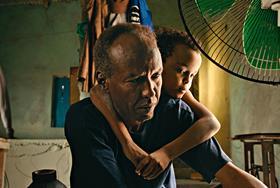Events move at ponderous pace in a film that is resolutely about a journey rather than a destination. Following a brother and sister living in the windswept village of Paradise, on the coast of Somalia, writer/director Mo Harawe’s feature debut is a determined attempt to find the normal, the mundane even, in a place that is usually portrayed in the media as anything but. Harawe, who was born in Mogadishu before emigrating to Austria at the age of 18 and subsequently studying film in Germany, has previously made short films including two set in Somalia; (2020), which bowed in Locarno, and (2022), which debuted in Berlin.
His first feature is also the first Somali film to screen in Cannes; something that should help it find an audience amongst fans of authentic world cinema at further festivals following its Un Certain Regard premiere. Harawe starts his film with a real-life English-language news bulletin about a US drone attack in Somalia, complete with on-screen explanatory graphics which makes the event look like a kind of video game. Editor Joan Scrinzi then cuts straight to a dusty Somalian roadside, where men (and excavators) are digging graves in the dirt; this juxtaposition between the at-one-remove observations of Western outsiders and the lived experience of Somalians is the narrative impetus of the film.

One of these hardworking men is Mamargade (Ahmed Ali Farah), whose regular job of burying the dead — often those killed in drone attacks — is becoming less luc.
















